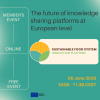The Toolbox provides an online outline on how information and materials developed within the activities of WP3 of the ISEKI-Food4 project can be used in the design of a module. A version of this concept map will form the basis for searching and accessing material and help a module designer develop a new module or modify an existing module.
The framework is divided into to three sections:
The first part deals with the selection of skills that are of interest to the module designer. i.e., the grey boxes. The designer could search for skills based on (i) the type of skills (soft or sector specific; (ii) Module scientific area or (iii) skills delivery level (introduced, developed and/or assessed). At this search stage, examples of where these skills have been implemented can be viewed. The module designer can select a list of skills that would be included in the module.
The second stage (see yellow boxes) would be to determine if the selected skills should be included in an existing module or used to develop a new module. The next series of questions in the concept maps guides the module designer in writing the appropriate learning outcomes for the module. Examples of learning outcomes from the ISEKI minimum standards and EQAS-FOOD standards can be examined, together with examples of how learning activities are delivered in modules to achieve learning outcomes. The module designer can use these examples as a guide to develop their own learning outcomes.
The final stage is the actual design stage, where learning activities, assessment and feedback can be designed. Examples of how activities can be assessed can be found here. The module description and handbook can then be finally developed.





